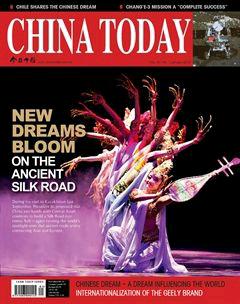On Chinese Media
Caijing
Issue No. 34, published Dec. 2, 2013
Rural Reforms Underway
The Third Plenary Session of the 11th CPC Central Committee carved out a niche in history by launching reforms in Chinas countryside, reigniting farmersenthusiasm for rural production by introducing the household contract responsibility system and separating ownership and usage rights of rural lands. The rural economy then began to boom.
Under the onslaught of urbanization and industrialization at a breakneck pace in recent years, the composition of the rural economy has undergone drastic changes. Collective economies have ballooned. In some developed regions the assets of a single village outnumbers those of an entire town or county in the western provinces. Lack of clear definition and regulation of collective property rights has now become an obstacle to further marketization of the rural economy.
The Third Plenary Session of the 18th CPC Central Committee has vowed to advance the modernization of the countrys governing system and capacities. A critical component of this goal is also better management of rural areas, entailing the stability of Chinese society and further development of the rural economy. Regions around China have all made efforts in this regard, and their experiences are valuable for ongoing and upcoming national reforms.
Life Week
Issue No. 48, published Dec. 2, 2013
4G Living
Technology develops much like a winding river flowing quietly through the forest, so most of the time it cannot be seen. Yet it eventually feeds into the sea one day to face broader prospects. Nevertheless, we are neither able to tell the exact time and place this will happen; nor do we know in which direction it could flow. Such imagery reflects the developments of communication operators and IT enterprises over the past two decades.
In 1998, China proposed the TD-SCDMAs technological standard to the International Telecommunication Union (ITU). In 2012, the TD-LTE, a newgeneration broadband mobile communication technology led by China Mobile, was set by the ITU as one of the two major international 4G standards.
The rapid stepping up of wireless transmission speed is set to stimulate development of mobile terminal devices and third-party application services. Today, smart phones and tablet PCs have surpassed traditional PCs to become the most often used devices in daily life, generating the mobile internet boom.
The upcoming 4G era will definitely be linked with big data and cloud computing. In what ways might our lives change in this information-based and data-driven era? Just use your imagination.
Oriental Outlook
Issue No. 45, published Nov. 28, 2013
Why Do People Not Trust GM Foods?
At the end of 2001, Genetic Engineering – Dream or Nightmare was published in China. The book introduced Chinese readers to the debates on genetically modified (GM) crops in the Western world, triggering a focus by industry insiders on GM foods.
Alongside interventions by some websites characterized by ideology, the disputes about GM foods have been upgraded to a collision between different social concepts. Expanding from the scientific field to social networks, the debates on GM food have attracted the attention of more and more diverse social groups. The varied opinions and intense disputes have also confused and misled more and more common people about GM foods.
In fact, scientists who are against GM foods are not totally averse to research in this regard. Their main concern is the precision of scientific experiments and the publics right to know the truth. Some experts believe that most peoples attitudes towards GM foods are too extreme, and that it is irrational to either blindly advocate GM food or totally oppose it. Anyway, publicizing the results of GM food safety testing is big progress.
China Newsweek
Issue No. 43, published Nov. 25, 2013
Ambitious Reforms
The Decision on Major Issues Concerning Comprehensively Deepening Reforms, adopted at the close of the Third Plenary Session of the 18th CPC Central Committee, spells out Chinas most ambitious reform plans in three decades. Setting the course of reforms for the coming five to 10 years, the Decision pinpoints key areas for deepening reforms, sets specific goals, and establishes a timetable for achieving the envisioned breakthroughs.
The document presents a panoramic depiction of the planned reforms in 15 domains, including easing the one-child policy, postponing the retirement age, reducing college entrance exam subjects, improving the pay-increase mechanism, promulgating real-estate tax law, and opening household registration to non-locals in small cities. These changes address major concerns in the everyday lives of Chinese citizens.
Now China faces the more challenging task of putting these words into action, to make the ambitious plan a reality. It is expected that the ship of reform will brave perilous waters and treacherous shoals before it reaches the land of felicity. President Xi Jinping is quoted as saying: “Reform is a response to living problems. It evolves in the course of working on these.”China has come to a critical point in its history, where only reform holds the key to future development.

